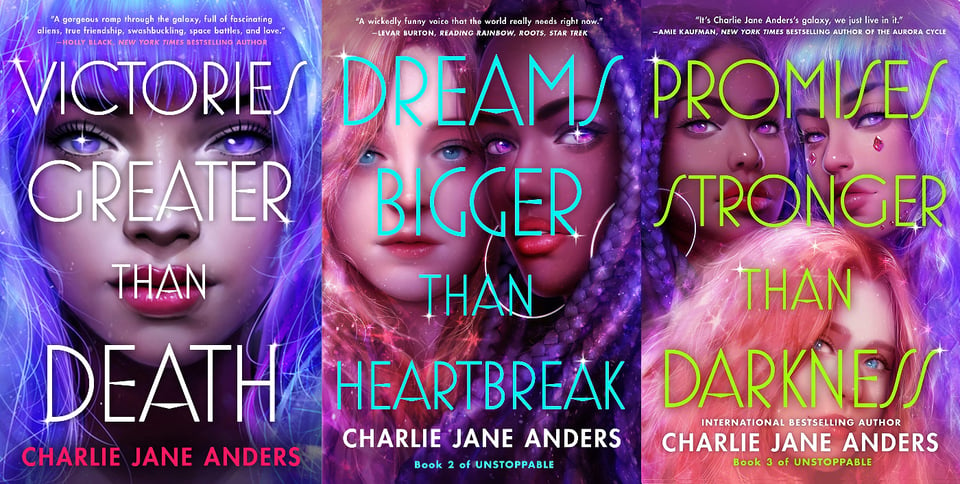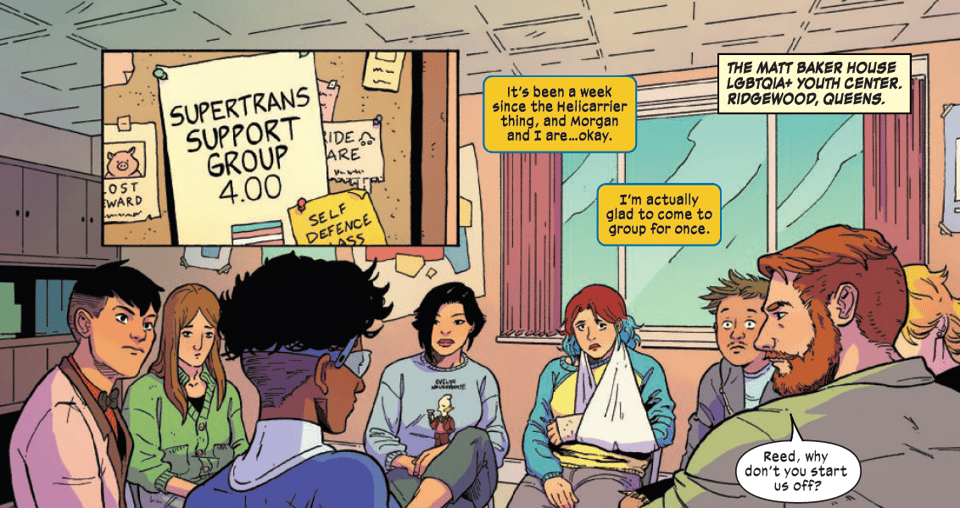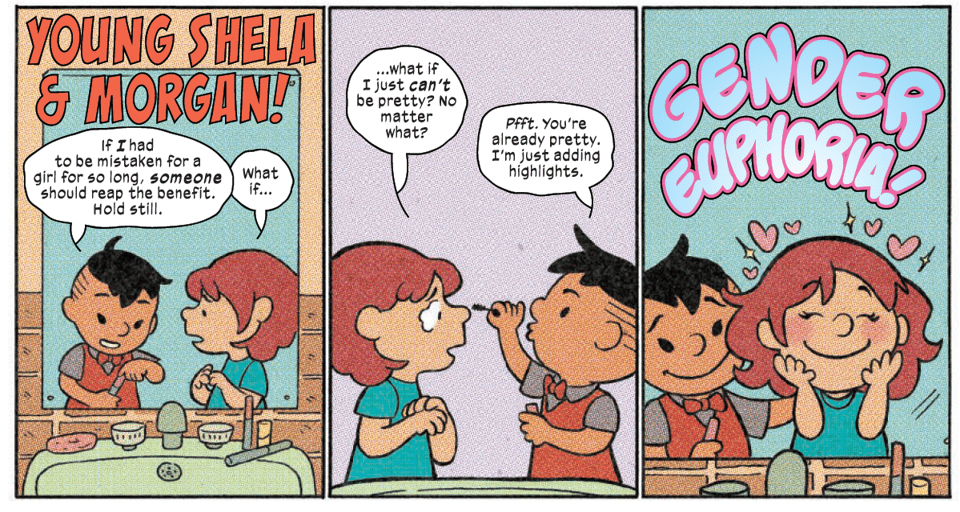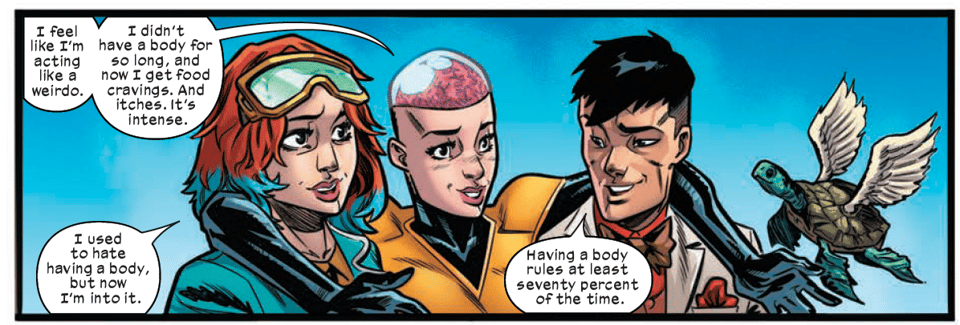Writing Trans Stories For Fun (and Liberation)
The Trans Rights Readathon is going on right now. Roughly a thousand people are reading trans stories and celebrating trans narratives, while raising money for trans causes. I highly encourage you all to get in on this! Also, this Sunday is the Trans Day of Visibility.
So I thought for this week's newsletter, I would share some stuff I've learned/decided about writing trans stories.
First, a shameless plug: if you're looking for stuff to read for the Trans Rights Readathon, you might consider checking out my Unstoppable trilogy — a young-adult space opera where the universal translator makes sure you always use everyone's correct pronouns. One of the three main heroes, Elza, is a trans-feminine person, and her friend Kez comes out as genderfluid in the second book, among many other queer characters. These books were banned/challenged in Tennessee, and I'll never know what other places decided not to carry them for fear of a backlash — so it makes me really happy to see some folks on Instagram recommending them as part of the Readathon.

Also! I helped to create a trans superhero named Escapade for Marvel comics, and you can read about her adventures in the 2022 pride issue, New Mutants Vol. 4 and New Mutants: Lethal Legion. And my short story collection Even Greater Mistakes is full of trans stories, including "Don't Press Charges and I Won't Sue," the horror story that won the Sturgeon Award.
Finally, if you're looking for some great trans reads by other authors, this post from last year has some of my favorites.
Okay, with that out of the way, here are some handy tips for writing trans stories:
1) Depict trans people as neither saints nor monsters
This is a huge one for me. Right now, the world is flooded with horror stories about trans folks: we're predators, we groom your children, our existence threatens civilization as we know it, and we even cheat at sports. It's awful tempting to respond to all of this demonization by showing trans people as virtuous, flawless human beings, as a kind of counterweight. Indeed, the way our oh-so-enlightened politics seem to work is that marginalized people can only ever be perfect or irredeemably evil, depending on which piece of anecdotal evidence you're consuming today.
But we shouldn't need to be angels in order to deserve basic rights — and both angels and demons are set apart from everyone else, effectively cast out of society. We need to see trans people with human foibles and a capacity for making truly grievous mistakes, who are still totally lovable. That's how we win the war for acceptance in the minds of people whose brains are so feeble that the least bit of anecdotal evidence can sway them in one direction or the other when it comes to basic human rights. But more importantly, it's how we see ourselves and understand that we deserve love even if we screw up sometimes. Not to mention, it's a well-known fact that protagonists who mess up are easier to root for.
2) Show trans community
Being trans does not mean you need to be alone, even if cis people in our lives aren't always accepting. So it's important for us to see trans community and other support systems in our stories, and to understand that we don't exist in a vacuum. (Unless you're in outer space, in which case, yeah.) When I was writing Escapade's introductory story in the 2022 Pride issue, I was determined to show her attending a support group for young trans mutants. I actually came up with a whole group of other trans mutant characters, besides Escapade and her best friend Morgan Red, for her to process stuff with.

But then it turned out that elsewhere in that same issue, the wonderful Grace Freud, Scott B. Henderson and Lee Townsend had already created a trans mutant support group for their own story, so I was encouraged to reuse those characters instead. Which ended up being a total blast, because they were super fun! Anyway, love seeing trans community — and it's also important to show that no two trans people are the same, and we don't all agree on everything (to put it mildly.)
3) Show people who aren't defined by their transness.
Trans people get to have the same amazing adventures as everyone else, without our situations being circumscribed by the fact that we've customized our shit. I want to see trans people getting to save the world, the same as everyone else. I also like to give trans characters unfinished business and concerns that do not relate to being trans. A lot of Elza's trauma in the Unstoppable trilogy relates to having been made to feel unwelcome in nerd spaces, an experience that many folks, with various identities, have had. My favorite trans characters have complicated backstories and rich adventures, the same as any other kind of character.
4) Let us see trans joy in the midst of darkness
I love writing a makeover scene, because I'm just that basic. One of my favorite scenes in the Unstoppable trilogy involves Elza putting makeup on Kez for the first time ever, using all kinds of high-tech alien cosmetics. Kez and Elza are on an alien planet that's just been taken over by evil fascists, so the situation is tense as heck. But in the midst of this, Kez gets to feel beautiful and seen in a whole new way. I also snuck a makeover scene into Escapade's first story, right after Shela/Escapade has gotten thrown out by her transphobic parents:

I love getting to see trans joy and queer joy on the page (and on screen), but I especially love them against a scary dark backdrop. Don't get me wrong, I am here for queer comfort reads — but there's something reassuring about seeing that we can have joy and warmth and tenderness when the world is turning ugly.
5) Don't focus unnecessarily on medical shit
It used to be that every trans story seemed to spend an inordinate amount of time talking about hormones, surgery, and other interventions, as if medical treatments are what make us trans, or the medical establishment is the main thing we have to deal with. (Or it's up to medical professionals to decide if we're "really" trans.) It honestly gets kind of voyeuristic.
I've been happy to see way more trans stories in the past several years, where the medical aspects of transition are either never talked about, or only mentioned in passing. In my own recent work, I tend not to get into the weeds on the physical transformation so much anymore. That said, if talking about medical shit is a window into someone's insecurity, or into the overall precarity of their situation, then that can be totally valid. For example, the excellent novel World Running Down by Al Hess includes the main character's desire to get scarce medical treatments as a powerful motivation, and a sign of how messed-up the world is.
6) Show trans people and other folks finding common ground
I love reading, and writing, moments where trans and cis people discover that they face some of the same issues — because bodily autonomy is a thing we all have to fight for. Plus, so many of us are judged one way or another for our failure to conform to other people's standards for what a man or a woman should look like, or whether you should be one or the other. A huge light-bulb moment for me early on was when I made friends with some fat activists, like Marilyn Wann, and came to realize that fatphobia and transphobia had a lot in common.

If you'll pardon one more example from my own work, one of my favorite moments in my New Mutants run is when I get to put my trans characters, Escapade and Morgan, alongside Cerebella, who used to be a brain in a globe and is now dealing with the strangeness of having a new body — something that feels like it has something in common with transness, in a way. This kind of plays into the thing I wrote about before where it's cool to place trans people alongside metaphors for transness.
7) Be fucking fearless.
Writing any kind of story is a scary proposition, especially if it deals with personal stuff. And writing about trans people during a bogus moral panic is especially daunting -- it's easy to either pull your punches, or feel as though the burden of good trans representation weighs on your shoulders.
The good news is that we are living during a time of extreme riches when it comes to trans stories, and a ton of wonderful authors are writing trans tales that defy categorization and bust through boundaries. So please write the story that speaks to you, the story that only you can tell about your own obsessions and dreams. It can be scary or funny or comforting or escapist, or all of the above — don't worry that what you write will be singled out as the One True Trans Story, or seen as a representation of all trans people. Just write your story.
I really hope this amazing moment lasts, and we keep getting such a wealth of fearless wild trans lit. And that's why it's so important for all of us to support trans writing as much as we can, wherever we can, in any way we can. So... happy Trans Rights Readathon! I hope the Trans Rights Anteater visits your house this year.
Two Music Videos I Love Right Now
I just came across two kick-ass queer music videos by Bay Area icons, and I had to share them with you. First:
Shawna Virago, "The Barman's Daughter." She directed this video for her own song, featuring Churro Nomi and Mira. Shawna Virago is still rocking out as hard as ever, and this song is already fully stuck in my head. See how many North Beach locations you can spot!
Erica Dawn Lyle & Vice Cooler "The Immortals" (featuring Brontez Purnell). Brontez Purnell, local writer, zinester, musician and all-around brilliant person, brings so much energy to this video, which seems to have been filmed in a supply closet. This song is also a total earworm and continues the rocking twangy guitar theme from "The Barman's Daughter."